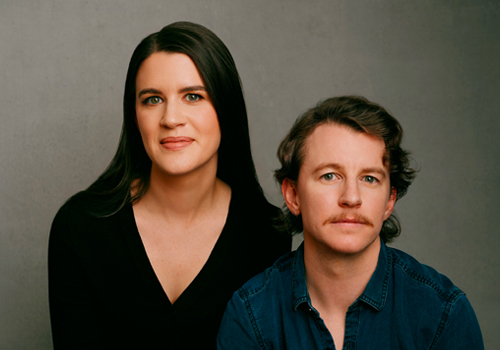← Back to June 2025 Newsletter Contents
DSR alumna (double major Religion and Ethics, Society & Law) Rachel Browne’s debut book, Let Us Play: Winning the Battle for Gender Diverse Athletes, explores her brother’s experience as the first openly transgender athlete in a professional team sport.
An investigative journalist, documentary producer and podcaster, Browne co-authored Let Us Play with her brother, Harrison Browne. The book combines Harrison’s lived experience as a trans man competing first in college and then in professional hockey with original research and personal testimonials from other trans athletes.
“It was an interesting experience for me to work with my sibling, to mine his experience and then weave it with my skill set, which is writing and explaining complicated ideas for a wider audience,” says Rachel, who earned her honours bachelor of arts in 2012 as a member of Trinity College.
Let Us Play is a departure from Rachel's usual work as a freelance investigative journalist and contributing writer at The Walrus. Her feature stories and documentaries tackle crime, religion, politics and more — areas she first explored while studying religion and ethics, society and law at U of T.
“I grew up being very interested and skeptical of religion,” she says. “When I took a politics of religion course, I just knew I was going to add religion as a major.”
Rachel began in journalism during her graduate studies and then returned to U of T where she took part in a fellowship in global journalism at the Munk School. She spent much of her early career at VICE, as well as Maclean’s and Global News, before eventually pivoting to freelance.

The idea for Let Us Play took shape in 2020 at the start of the pandemic. Rachel and Harrison were living in Toronto. Harrison had recently retired from professional hockey and begun a career in acting, writing and directing, pushing for more on-screen trans representation.
Harrison began the book as a memoir but was convinced to take a more all-encompassing approach that broadly promotes the inclusion of trans athletes in sport. The new scope called upon rigorous research and fact-finding.
“This book gives people a cheat sheet,” Harrison says. “It’s a handbook to explain why this is an important topic and help them speak on it.”
Rachel says researching for the book gave her a deeper understanding of her brother’s story, including the period when he began living more openly as himself — changing his name and pronouns publicly — while he was playing on a women’s hockey team in college.
“It was really heartening to learn how important those teammates were at a time when he was struggling and figuring things out,” Rachel says.
Harrison’s experience stands in sharp contrast to other athletes in Let Us Play, many of whom faced staunch resistance from administrative bodies, the media and the public.
“It's really disheartening to see the state of sports right now and trans inclusion,” Harrison says. “Sports have so many issues, and trans people are the least of them.”
“I hope people come away with a sense of the humanity behind all the stories we share about athletes and their parents,” Rachel says. “These draconian policies proposed by sports administrators, politicians and government bodies are only going to have detrimental impacts, especially on young people.”
With Let Us Play, Rachel stepped outside her comfort zone by including opinion along with more traditional journalistic analysis.
“I had more freedom to say: this is wrong, this is right, this is what should happen,” she says. “I could be more prescriptive.”
Rachel recently returned to U of T for an alumni panel in celebration of the Department for the Study of Religion’s forthcoming 50th anniversary. She says she is still drawn to stories dealing with matters of faith and belief.
Let Us Play will be released on May 27. To help promote the book, Rachel and Harrison will be featured in Curious Minds Author Talks, part of the Hot Docs Cinema Series.


